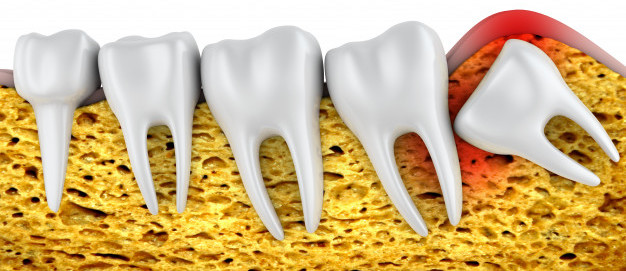
Wisdom teeth, often referred to as your third molars are your last teeth to emerge and will generally come through between the ages of 17 and 25. Normally you would expect a wisdom tooth in both sides of your upper and lower jaws, although sometimes the wisdom tooth can be genetically absent.
Oral Health Concerns With Wisdom Teeth in Balwyn
For some, wisdom teeth erupt without issue, but for others, they can pose oral health concerns. Problems arise when there isn’t enough space for them to emerge properly, potentially damaging adjacent teeth, gums, and jawbones.
Impaction and Infection
Wisdom teeth can be partially impacted (crown emerges) or fully impacted (no emergence), often due to incorrect angles. Impaction can lead to infection, swelling, and pain. Problems occur with wisdom teeth when there is not enough space at the back of your jaw to allow them to erupt without causing damage to adjacent teeth, your gums and jawbones. This can sometimes take several years to become apparent and will not always cause pain alerting you to a problem.

A wisdom tooth can be described as partially impacted, meaning some of the crown has emerged through the gum-line, or fully impacted, where no part of the tooth has emerged, this can be caused by the tooth growing at an incorrect angle. When a tooth becomes impacted, an infection resulting in swelling and pain can also result.
Diagnosis and Treatment for Wisdom Teeth in Balwyn
At Boroondara Dental, we can do a complete assessment of your wisdom teeth in-house with our imaging equipment. We’re able to take and analyse with increadible precision an OPG (2D image) and Cone Beam CT (3D image) all in the same appointment without leaving the comfort of our Balwyn practice. This will provide us with the exact location of your wisdom teeth from which we can develop a tailored treatment plan should a problem be diagnosed. Read all about the latest technology and equpment at Boroondara Dental
Our pricipal dentist, Dr John Chen has extensive experience that is demonstrated in many years of expert treatment of widsom teeth in Balwyn. Depending on your personal situation, the number of teeth being removed and their condition and position, we may remove them within our practice under a local anaesthetic or you may be referred to a specialist in rare situations.